What changed after a village air base was used as an asylum centre?
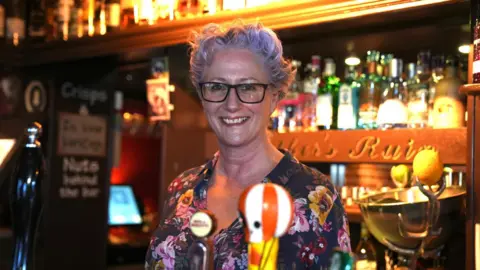 John Fairhall/BBC
John Fairhall/BBCIn March 2023, the government decided a former air base one mile from a small rural village in Essex should be used to house male asylum seekers. Two years on, what is it like for the local community and migrants living at MDP Wethersfield?
A few minutes' drive from Wethersfield is the picture-postcard village of Finchingfield. Adorned with tea rooms, pubs and a duck pond surrounded by Georgian homes, it is less than two miles from the migrant accommodation.
The Finchingfield Lion pub was packed on a Friday afternoon, with a roaring log burner warming the locals.
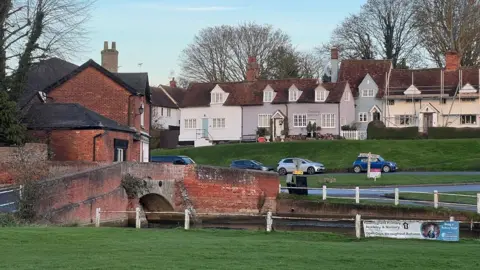 Simon Dedman/BBC
Simon Dedman/BBCLandlady Jacqui Braithwaite says the direct impact on the community from the asylum seekers was "negligible" and residents "rarely" saw small groups of people from the base walking around the area. But she feels the centre has affected the area in a different way.
"The impact on the people here has been really profound. It has divided us - the whole community. There were probably loads of racists here before but it never showed," she says.
"When the asylum [centre] happened, people just started saying things and they felt OK saying them. Horrible, racist things.
"I have people who don't come into my pub anymore. I came out as non-racist. I did a post that said they are just people, they are not bad people, they have been given a really crap hand and they are trying to find a way to live, to find a life.
"People are blaming them for everything. Anything that gets nicked or any can thrown out of a car into the hedge rows, all of a sudden it is 'because of asylum seekers'."
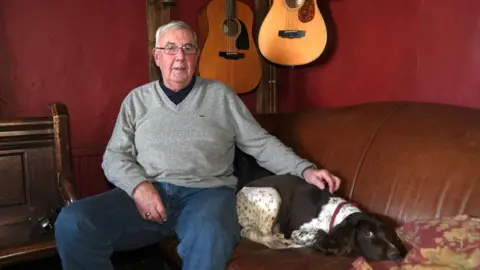 John Fairhall/BBC
John Fairhall/BBCPhilip O'Reilly is sitting with his spaniel nursing a pint of local bitter in Jacqui's pub. He says he is neither for nor against the asylum seekers at the base.
"I'm more concerned when I or my wife go shopping in Braintree," he says. "Without a doubt, there are groups of men not native to England that seem to gather on corners, more on market day.
"I have had one or two of my female neighbours who feel uncomfortable in Braintree town centre."
Tony Clarke-Holland lives metres from MDP Wethersfield's perimeter fence, which was previously one of the remotest areas of Essex. Over the past two years, he described the base as having become a hub of activity again.
He says: "It's become our new norm. It impacts everyone's life, sometimes it's more of a mental and intangible thing. You are living with it daily.
"We hear noise and bits and bobs on occasion. Before, it was a very quiet area."
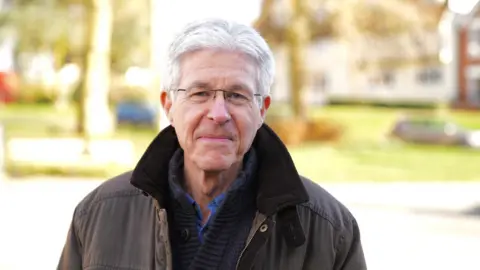 John Fairhall/BBC
John Fairhall/BBCAlan Mackenzie, the chair of the campaign group Fields Association, says when the decision was announced "there was a tremendous amount of concern by everybody in the area, because there is no experience of anything like this".
He says: "[Wethersfield] is a village of just 700 people. Having the possibility of 1,700 asylum seekers descending not that far away on a small village was a serious concern."
Yet, he adds, "a lot of those fears haven't come to fruition". The estimated 500 migrants "seems to be a number which is kept under sensible control up at the base".
What is MDP Wethersfield?
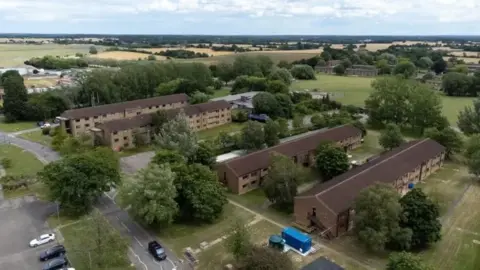 PA Media
PA Media- The site is a former RAF base owned by the Ministry of Defence
- MDP stands for Ministry of Defence Police
- It houses single adult male asylum seekers aged between 18 and 65
- The first migrants moved into the accommodation in July 2023 and about 530 men currently live there
- A High Court judge found Suella Braverman acted unlawfully as home secretary when three vulnerable asylum seekers were housed at the site
- The judge added there were no wider "systemic failures" in housing migrants at the base
Source: BBC/Home Office
Among those living at MDP Wethersfield is Kareem, 25, who is part of the Bidoon minority in Kuwait. He recently arrived in the UK by boat from Calais.
On a Sunday evening Kareem, alongside about two dozen other men who are mostly from the Middle East, Africa and Asia, dons a football kit and borrowed boots to enthusiastically kick a ball across an icy pitch.
The players are all asylum seekers living at Wethersfield, who compete in Wethersfield FC – a football league amongst the men at the base.
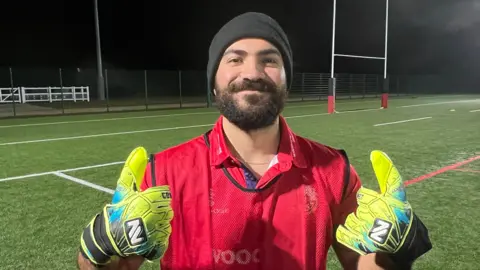
Kareem describes the accommodation at Wethersfield as "great".
"I love the camp, I love where I live... I want to be in the UK instead of any other country in the world, because the UK is helping everyone who don't have rights."
He says his community is denied education, access to work and citizenship in Kuwait. The UK government says the Bidoon people have been classed as "illegal residents" by the Kuwaiti state since the 1960s.
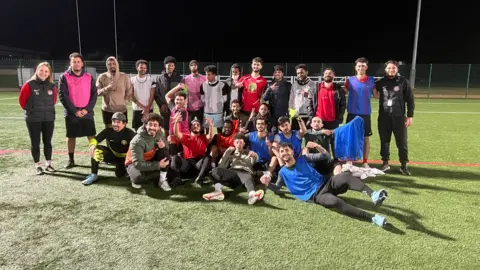 Simon Dedman/BBC
Simon Dedman/BBCLiubov Liushnenko, 28, is a Ukrainian refugee and works for the charity Changing Lives, which provides sporting activities at the base, such as football, table tennis and volleyball. She says the men have always treated her with respect.
"I feel safe, I feel respectful. They are wonderful," she says.
"In their countries, in their religions, they are not allowed to say something bad about a woman. I feel absolutely safe there."
English, art and music lessons are also provided with support from the Home Office and Braintree District Council.
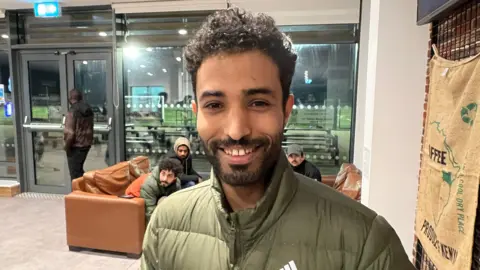
Another player, Saleh, 28, from Yemen, said: "It's like normal, it's fine on Wethersfield. It's not better than other places, but it is fine."
In 2023, some asylum seekers held protests outside the base over their living conditions, such as the quality of food and lack of activities.
Some of the men at the time reported there was "almost nightly fighting" between different groups and a 2024 British Red Cross assessment found more than 70% of residents did not feel safe on the site.
Yafet, 25, from Eritrea, says: "It's fine now. I have not seen this fighting during my time [at Wethersfield]... people love each other."
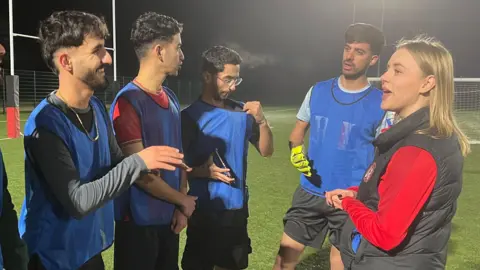 Simon Dedman/BBC
Simon Dedman/BBCThe Home Office said asylum seekers should stay for a maximum of nine months at Wethersfield and then be placed in dispersal accommodation – usually shared housing in towns and cities.
Yusuf, from Sudan, stayed at Wethersfield for six months and since December has been living in Colchester. He has just received his refugee status and wants to train as a plumber.
"I was scared from the first time I entered [Wethersfield]. But the time when I was there for six months, I have seen there was nothing to fear about it."
A Home Office spokesperson said: "We remain of the belief that the Wethersfield site provides fully adequate and functional accommodation."
Follow Essex news on BBC Sounds, Facebook, Instagram and X.
